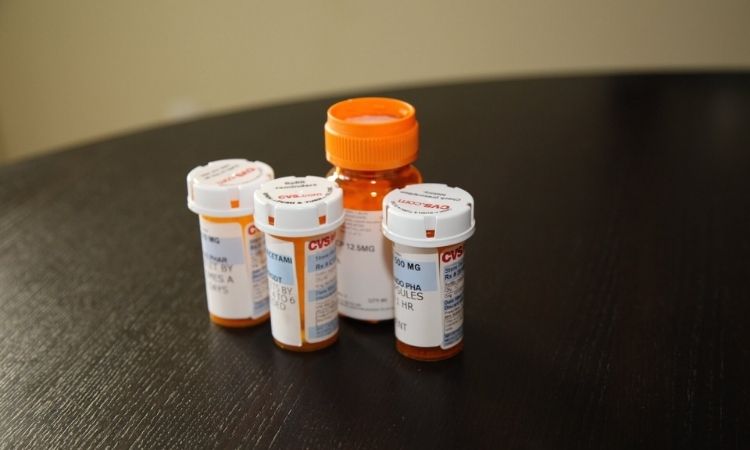
Are There Anti-Anxiety Meds That Aren’t Addictive?
Surely there are non-addictive anxiety medications. Aren’t there? You may have been prescribed Xanax. Addiction to benzos like Xanax has been well documented. Treatment options are available for benzo addiction. However, a person struggling with anxiety needs access to non-addictive anxiety meds. What are they? And how can they help? In this article, Blue Hills Recovery Center guides you through:
- What makes a medication addictive
- Understanding prescription drug abuse and addiction
- Examples of non-addictive anxiety medications
- Other anxiety treatment options to use with medications
- How to get help for Xanax (or other benzo) addiction
What Makes A Medication Addictive?
Each year, science gives us new information on the mechanics of drug addiction. Addiction has proven a complex phenomenon. We understand more about it than we did a decade ago. But innovations in addiction research occur almost daily. Addiction may originate in the brain. Some people have certain neurological conditions that predispose them to addictive behaviors. Trauma can also drive people into substance abuse. Therefore it’s easy to understand why the demand for non-addictive anxiety medications exists. But what about the medications themselves? Benzo addiction can begin in as little as 3-4 weeks. It’s easy to form an addiction to drugs like Xanax. Furthermore, the withdrawal symptoms can become severe. Benzos work quickly. Like opioids, it doesn’t take long for a person to notice a difference. Unfortunately, this effectiveness is what makes benzos addictive. This predicament is what drives many to look for non-addictive anxiety medications as an alternative.
Understanding Prescription Drug Abuse And Addiction
To be sure, people do abuse illegal drugs. Drugs like heroin, crack, fentanyl, and marijuana can lead to dependence and withdrawal. We must not ignore this reality. But, people can also abuse prescriptions. Even their own prescriptions. Just because a person has a prescription does not give them a license to use it as they see fit. Examples of prescription drug abuse include:
- Consuming a medication in a manner other than the one prescribed (i.e. snorting or injecting)
- Taking more than the prescribed dose of a medication
- Swallowing a medication with alcohol
- Combining a prescription with other medications that intensify its effects
- Giving away or selling one’s prescription
- Using someone else’s prescription
Substance Use Disorder
Even a prescription for Xanax can lead to abuse. The longer a person uses an addictive substance, the more they risk developing substance use disorder (SUD). Substance use disorder refers to a person’s inability to stop using a substance. Even when negative consequences arise, the person cannot quit. Someone in this scenario is now dependent on their substance. Their brains and bodies do not work correctly without the substance. Withdrawal represents the other side of this coin. Withdrawal symptoms set in when a dependent person stops consuming a substance. Some specific examples of substance use disorder:
- Alcohol use disorder
- Opioid use disorder
- Benzodiazepine use disorder
- Cocaine use disorder
Examples Of Non-Addictive Anxiety Medications
Remember, the best way to prevent addiction is to adhere to one’s prescription. Take your medication exactly as your doctor recommends. If you think you need to increase your dose, speak to your treatment provider first. If you have adverse effects, dialogue with your provider about possible changes to your medication.
Buspirone
You may see Buspirone under the brand name BuSpar or Vanspar. It is not a benzodiazepine like Xanax. Buspirone is an anxiolytic. It works by restoring balance to different chemicals in the brain. It has a low propensity for addiction.
SSRIs
Selective serotonin reuptake inhibitors (SSRIs) give us another option for nonaddictive anxiety meds. The neurotransmitter serotonin influences our moods. SSRIs work by keeping serotonin dispersed longer throughout our brains. They prevent the brain from reabsorbing serotonin. This helps improve one’s mood and temperament.
Pregabalin and Gabapentin
Pregabalin (Lyrica) and gabapentin (Neurontin) are two medications prescribed for seizures. However, they seem to have off-label uses for relieving symptoms of generalized anxiety disorder.
Beta-Blockers
Our bodies make a hormone called epinephrine (adrenaline). Epinephrine increases the heart rate and elevates glucose content in the blood. Beta-blockers reduce the effects of epinephrine on the heart. Since anxiety increases the heart rate, beta-blockers show some promise in helping with it as well.
Non-Addictive Anxiety Medications
One must attack anxiety from different angles. Medications can help – especially if you follow your prescription. But other options can help you address anxiety. Improving one’s diet can relieve stress and fear. As can implementing a physical training program. Lifting weights, running, bicycling, and yoga are popular exercises that can reduce anxiety. Psychotherapy can also help ease anxiety. You might consider a day treatment program. As a step down in restrictiveness, look into an evening program. Beyond that, also speak to your treatment provider about outpatient programs and aftercare.
How To Get Help For Xanax (Or Other Benzo) Addiction
Blue Hills Recovery Center offers treatment programs that implement nonaddictive anxiety meds. We also offer substance abuse treatment programs. If you or someone you love struggles with either substance abuse or mental illness, get help now. Call or contact Blue Hills Recovery Center.